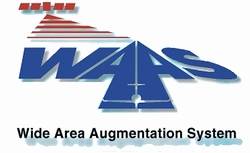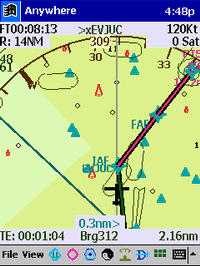Sun, May 09, 2004
Says It's Committed To WAAS
 Top officials at the FAA have told
AOPA that the agency is committed to maturing satellite-based
navigation for the long haul using the wide area augmentation
system (WAAS). During a meeting at AOPA headquarters on Tuesday,
executives from the FAA's Air Traffic Organization shared the
agency's latest program developments. They said part of the plan
for supporting general aviation's transition to WAAS is to develop
500 WAAS approaches each year, making the system more attractive to
GA pilots.
Top officials at the FAA have told
AOPA that the agency is committed to maturing satellite-based
navigation for the long haul using the wide area augmentation
system (WAAS). During a meeting at AOPA headquarters on Tuesday,
executives from the FAA's Air Traffic Organization shared the
agency's latest program developments. They said part of the plan
for supporting general aviation's transition to WAAS is to develop
500 WAAS approaches each year, making the system more attractive to
GA pilots.
WAAS is a ground-based system that adjusts for errors in signals
from the Global Positioning System, providing unparalleled
navigation performance. The FAA has taken a building block approach
to WAAS, adding enhancements as they become available. The system
currently supports approaches with minimum weather standards close
to those for instrument landing systems (ILS). Ultimately it will
be capable of precise ILS Category 1 guidance for approaches into
airports that don't have instrument landing system equipment.
"Using WAAS to deliver all-weather access to airports increases
a local community's access to the world," said AOPA President Phil
Boyer. "This is why AOPA embraced this navigation system early
on."
 The FAA expects to be able to
deliver Category I ILS performance throughout the continental
United States and parts of Alaska using WAAS. But that won't happen
until after a full constellation of new-generation GPS satellites
are in place, expected sometime around 2013.
The FAA expects to be able to
deliver Category I ILS performance throughout the continental
United States and parts of Alaska using WAAS. But that won't happen
until after a full constellation of new-generation GPS satellites
are in place, expected sometime around 2013.
"The fact that the FAA is looking beyond 2013 all the way to at
least 2028 illustrates the agency's commitment to a satellite-based
navigation system based on WAAS," said AOPA Senior Director of
Advanced Technology Randy Kenagy. "And the agency's acknowledgement
that they have to turn out hundreds of WAAS approaches each year is
the first step in getting the approach production started."
AOPA has championed a conversion to a satellite-based navigation
system since 1990. And during the development of what has become
WAAS, the association repeatedly told the FAA that the system must
be able to deliver the same accuracy, availability, and
dependability as the current instrument landing system.
More News
Its Offerings Are Lighter, Cleaner, and Now Pushing Past 1,000nm on SAF Jet Fuel DeltaHawk’s diesel-powered aircraft lineup has seen incredible upgrades over the last few yea>[...]
The Airplane Experienced A Total Loss Of Engine Power On December 3, 2025, about 1600 central standard time, a Mooney Aircraft Corp. M20K, N57229, was substantially damaged when it>[...]
Make Sure You NEVER Miss A New Story From Aero-News Network Do you ever feel like you never see posts from a certain person or page on Facebook or Instagram? Here’s how you c>[...]
Aero Linx: European Society of Aerospace Medicine (ESAM) As a pan-European, independent forum, it works to promote the safety and health of all persons involved in aviation and spa>[...]
“We are excited to see Wisk achieve this milestone, and I’m so proud of the team that made it possible. The team at Wisk has built advanced technologies across flight c>[...]
 Aero-TV: DeltaHawks Diesel Power Steps Into the Spotlight
Aero-TV: DeltaHawks Diesel Power Steps Into the Spotlight NTSB Prelim: Mooney Aircraft Corp. M20K
NTSB Prelim: Mooney Aircraft Corp. M20K ANN FAQ: Turn On Post Notifications
ANN FAQ: Turn On Post Notifications ANN's Daily Aero-Linx (12.20.25)
ANN's Daily Aero-Linx (12.20.25) Aero-News: Quote of the Day (12.20.25)
Aero-News: Quote of the Day (12.20.25)




